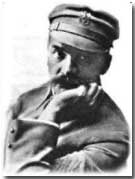Who's Who - Josef Pilsudski
 General Josef Klemens
Pilsudski (1867-1935), a long-time proponent of the cause of Polish
nationalism, led a Polish force which invaded Russia during early August
1914 while favouring an Allied success in the west.
General Josef Klemens
Pilsudski (1867-1935), a long-time proponent of the cause of Polish
nationalism, led a Polish force which invaded Russia during early August
1914 while favouring an Allied success in the west.
Pilsudski, born in Russian Poland, found himself exiled by the Russians to Siberia for five years from 1887 after campaigning on behalf of the Polish nationalist cause. He nevertheless returned in time at the head of the National Socialist Party and became editor of left-wing newspaper Robotnik.
Having formed a military unit he used it to undertake raids upon banks while at the same time murdering members of the Tsarist police force. In September 1908 Pilsudski and his associates successfully stole some 200,000 roubles from a mail train in Bezdany, which he subsequently used to fund the formation of a fresh revolutionary army.
When war in Europe broke out in early August 1914 Pilsudski seized the opportunity to personally lead Polish troops in an invasion of Russia on 6 August in a loose alliance with the Austrians, although he envisaged Polish independence stemming from an Allied victory in the west combined with a Russian defeat in the east.
With the Russians subsequently ousted from Eastern Poland by the Germans he accepted a position on the Polish Council of State in November 1916 following Poland's 'liberation' from Russia (a state of affairs declared by Germany and Austria-Hungary).
Finding his aims at odds with those of the controlling German authorities Pilsudski tendered his resignation from the Council (and as Minister of War) in March 1917 and was arrested by German forces in July following his repudiation of the German Warsaw Governor Hans von Beseler, and imprisoned until the armistice of November 1918.
Thereafter re-entering political affairs Pilsudski governed Poland for a while as an effective dictator prior to his formal election in February 1919 as its Chief of State; he was also made a Marshal.
The following year, 1920, Pilsudski fought against Russian Bolsheviks in the Russo-Polish War and succeeded in driving the latter from Poland following an engagement at the Vistula.
Retiring in 1923 Pilsudski re-emerged three years later and led a coup d'etat, securing renewed power until his death in 1935.
Click here and here to read the Polish Regency Council's announcements regarding Pilsudski's appointment at the head of government. Click here to read Pilsudski's address regarding his immediate post-war plans. Click here to read a French newspaper interview with Pilsudski.
In WW1 an "ace" was a pilot who scored five confirmed "kills".
- Did you know?
